
Malayalam, the lingua franca of the Indian state of Kerala and the union territories of Lakshadweep and Puduchery, is one of the six classical languages of India. Malayalam literature comprises those literary texts written in Malayalam, a South-Dravidian language spoken in the Indian state of Kerala. The first travelogue in any Indian language is the Malayalam Varthamanappusthakam, written by Paremmakkal Thoma Kathanar in 1785. Malayalam literature has been presented with 6 Jnanapith awards, the second-most for any Dravidian language and the third-highest for any Indian language.
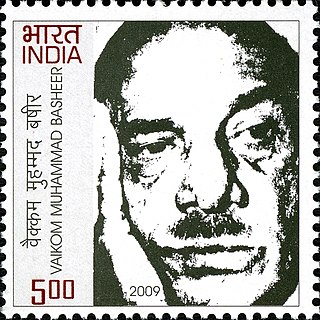
VaikomMuhammad Basheer, popularly referred to as Beypore Sulthan, was a writer of Malayalam literature. He was a writer, humanist, freedom fighter, novelist and short story writer, noted for his path-breaking, down-to-earth style of writing that made him equally popular among literary critics as well as the common man. His notable works include Balyakalasakhi, Shabdangal, Pathummayude Aadu, Ntuppuppakkoranendarnnu, Mathilukal, Janmadinam and Anargha Nimisham and the translations of his works into other languages have earned him worldwide acclaim. The Government of India awarded him the fourth highest civilian honor of the Padma Shri in 1982. He was also a recipient of the Sahitya Academy Fellowship, Kerala Sahitya Academy Fellowship, and the Kerala State Film Award for Best Story. He was a recipient of the Vallathol Award in 1993.
Premalekhanam is Vaikom Muhammad Basheer's first work (1943) to be published as a book. The novel is a humorous story of love. Through the hilarious dialogs, Basheer attacks religious Conservatism and the dowry system.
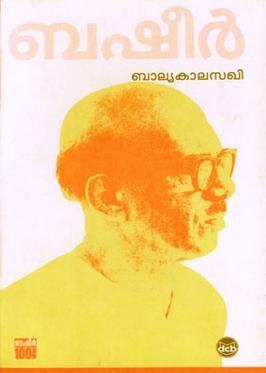
Balyakalasakhi is a Malayalam romantic tragedy novel written by Vaikom Muhammad Basheer. Published in 1944, it is considered by many as Basheer's best work. The story revolves around Majeed and Suhra, who are in love with each other from childhood. By Basheer's own admission, the story is largely autobiographical.
Menacherry Poulose Paul (1904–1952) was an academic, educationist, scholar and literary critic of Malayalam. Considered by many as one of the major literary critics of Malayalam literature, Paul inaugurated comparative literature in Malayalam through his works, Novel Sahithyam and Cherukatha Prasthanam. He was the founder of parallel college education system in Kerala, one of the major forces behind the Purogamana Sahitya Prasthanam and was the founder president of Sahithya Pravrthaka Sahakarana Sangham, the writers' cooperative movement.

Pathumma's Goat is a 1959 Malayalam novel by Vaikom Muhammad Basheer. The characters of the novel are members of his family and the action takes place at his home in Thalayolaparambu. The goat in the story belongs to his sister Pathumma. Basheer begins the novel with an alternative title for the book, Pennungalude Buddhi.

Mathilukal is a Malayalam novel written by Vaikom Muhammad Basheer in 1965. It is one of the most cherished and well-known love stories in Malayalam. Its hero, Basheer himself, and heroine, Narayani, never meet, yet they love each other passionately. Despite being imprisoned and separated by a huge wall that divides their prisons, the two romance each other.

Thakazhi Sivasankara Pillai, popularly known as Thakazhi after his place of birth, was an Indian novelist and short story writer of Malayalam literature. He wrote over 30 novels and novellas and over 600 short stories focusing on the lives of the oppressed classes. Known for his works such as Kayar and Chemmeen, Pillai was a recipient of the Padma Bhushan, the third highest Indian civilian award. He was also a recipient of the Jnanpith, India's highest literary award, awarded in 1984 for the novel Kayar.
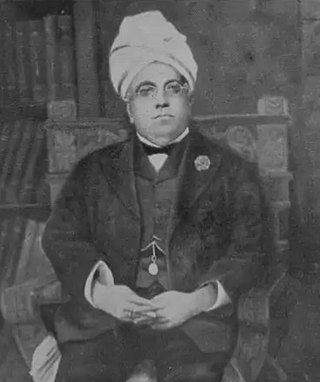
Vengayil Kunhiraman Nayanar was a Malayali essayist and short story writer, and a prominent landlord of Malabar district.
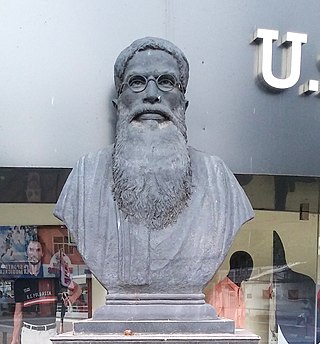
Akathoot Balakrishna Pillai (1889–1960), better known as Kesari Balakrishna Pillai, was a Malayalam writer, art and literary critic and journalist, considered by many as one of the most influential thinkers of modern Kerala. He was the eponymous founder of the newspaper, Kesari and was one of the three major figures in modern Malayalam literary criticism, along with Joseph Mundassery and M. P. Paul. Besides works such as Kesariyude Lokangal, Navalokam, Sankethika Nirupanangal Sahitya Nirupanangal, Rupamanjari, he also wrote a text in English under the title, Outlines of the Proto-Historic Chronology of Western Asia.
Karimpumannil Mathai George (1914–2002), popularly known as Dr. K. M. George, was an eminent Malayalam writer and educator. An erudite scholar and literary critic with astute organisational capabilities, he is best known as a pioneer of Comparative Indian Studies and Literatures. He was a recipient of the fourth highest Indian civilian honour, the Padma Shri, the highest literary award of the Government of Kerala, the Ezhuthachan Puraskaram and the third highest Indian civilian award, the Padma Bhushan, besides other honours.
Edappally Raghavan Pillai was an Indian poet of Malayalam literature and a close associate of Changampuzha Krishna Pillai. The pair, the front-runners of romanticism in Malayalam, was considered by many as the Shelley and Keats combination of Malayalam poetry. Kesari Balakrishna Pillai compared Pillai to the Italian poet, Giacomo Leopardi.

Mathilukal (transl. Walls) is a 1990 Indian Malayalam-language film written, directed and produced by Adoor Gopalakrishnan based on the autobiographical novel of the same name by Vaikom Muhammad Basheer. The film focuses on the prison life of Vaikom Muhammad Basheer and the love between him and Narayani, a female inmate of the prison, who remains unseen throughout the film. Mammootty plays the role of Vaikom Muhammad Basheer while K. P. A. C. Lalitha gives voice to Narayani. The film was screened at the Venice Film Festival.
"Ente Thankam" is a short story written by Vaikom Muhammad Basheer. It is his first published work. Originally published in the now-defunct newspaper Jayakesari in 1937, it was later published in the collection Vishappu under the name "Thankam". A path-breaker in Malayalam romantic fiction, it had its heroine a dark-complexioned hunchback.

Balyakalasakhi is a 2014 Malayalam language film adaptation of the famous novel of the same name by Vaikom Muhammad Basheer. The romantic musical drama film was written and directed by debutante Pramod Payyannur and stars Mammootty, Isha Talwar, Meena, Seema Biswas, KPAC Lalitha and Mamukkoya in lead roles.
The Malayalam novel is an important part of Malayalam literature. This article focuses on novels, written in Malayalam language, a Dravidian language spoken predominantly in the Indian state of Kerala and the Lakshadweep islands.
Ronald Eaton Asher was a British linguist and educator specialised in Dravidian languages. He was a fellow of the Royal Asiatic Society of Great Britain and Ireland (1964), a fellow of the Royal Society of Edinburgh (1991), and an honorary fellow of the Sahitya Akademi.
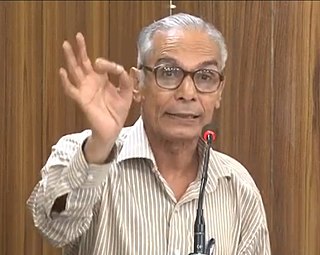
Sudhanshu Chaturvedi is a writer, translator and academic from Uttar Pradesh, India. He has authored or translated over 120 books in Malayalam, Hindi, Sanskrit and English. Even though his mother tongue is Hindi, he has written most of his books in Malayalam.

Erumeli Parameswaran Pillai was a Malayalam-language writer, teacher, scholar, and literary critic from Kerala, India. He wrote over forty books, including five novels, four collections of stories, 11 scholarly works, and a few one-act plays and children's literature. He is also known for the work Malayala Sahityam Kalaghattangaliloode, a comprehensive history of Malayalam literature. He received the Kerala Sahitya Akademi Award for Overall Contributions in 2009.











